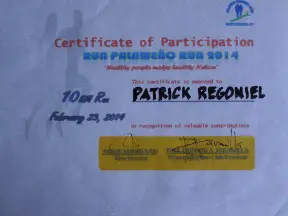How can research findings be put to practical use? Here’s an account of how research findings were used to improve one’s health condition through a systematic application of the principles of aerobics.
On February 23, 2014, I joined a 10-kilometer run of a local runners’ club to test whether I can keep up with the pack. I woke up early in the morning at about 4 o’clock to ready myself for the 5:15 AM run.
At age 51, once hypertensive and sedentary for at least four years because of the “lack of time” to exercise and too engrossed at work, doctors 50 years ago would not recommend what I intend to do. It would be too risky at my age. That is what they say. Accordingly, as people reach middle age, medical doctors once recommend that they should take it easy. Strenuous exercise must be avoided as much as possible for fear of heart attack, stroke, bone injuries, among others.
But I was comforted by the fact that a groundbreaking approach to develop endurance in running or walking long distances was developed by Dr. Kenneth Cooper in his aerobics book in 1960. I happened to see the book in a book sale center as I browse for useful tips on health and self-development.
About the Aerobics Book
The aerobics book outlines how one can build up stamina and endurance in running by undertaking a 16-week aerobics program. The idea behind this book is to build running capacity gradually using a point system. As one progresses, he adds more points until a 30-point week is achieved.
I was able to reach the 30-point week with diligence at week 29 or in August of 2013. Now, I can achieve the 30-point week effortlessly. And the last record I had in my three workouts per week is 48 points. I can easily exceed the 30-point week requirement without feeling too tired to walk or feel anything uncomfortable with my joints. I have maintained the pace and increased my points — gradually.
The key in this approach to stamina building is — gradual. My arteries and veins increased in size gradually. Thus, my blood pressure normalized and even my heartbeat per minute went down.
Slow Heart Rate?
Last March 4, my heart rate was only 44 when I checked it early in the morning before my workout. Is this abnormal? How slow can a heartbeat get?
My doctor was a bit alarmed during my last medical check up because he said, the military SWAG (similar to the US SEAL team) he checked have heartbeats averaging 60 per minute. There may be something wrong with my wrist blood pressure monitor or I have bradycardia or slow heart beat which is linked to problems with the electrical system of the heart. So I told him about my workout and he nodded in agreement that I am okay.
Mayo clinic says a normal resting heart rate ranges from 60 to 100 beats per minute. However, a slower heart rate at rest implies more efficient heart function and better cardiovascular fitness which is true for well-trained athletes who usually approach 40 beats a minute.
This means that it takes much less effort to pump the blood all throughout one’s circulatory system as the heart is strong. That’s how Dr. Cooper explained it.
Performance in the 10K Run
How did I perform in the 10-kilometer run which I ran for the first time? Well, I finished 12th, that is, from the last runner who finished the fun run. 🙂 I did it in one hour and three minutes and got a certificate as a finisher of the 10K run.

I mentioned my accomplishment to a colleague who runs regularly. He said, my performance was good because normally, runners are expected to finish the 10K run in one hour and 15 minutes. In fact, I bested 11 other runners I saw still running towards the finish line on my way home. And not only that, I learned later from a runner friend that there were still other runners who decided not to finish the run; either because they were not able to keep up with the top ten runners or they can no longer make it. It gave me somehow a sense of pride for my accomplishment. What a pleasant surprise.
Dispelling Old Myths
How was this accomplishment made possible? A systematic approach was applied by a doctor of medicine and a former Air Force Colonel to dispel old myths that “when you get older, you need to take it easy.” That’s not true. Just like a machine, the body should be worked out regularly. If not, the rust will take over or the parts deteriorate prematurely such that it will not work efficiently anymore.
Dr. Cooper did research and applied his findings. Now, he is in the forefront of preventive medicine. We enjoy the fruits of his labor and gain more control of our health.
Ah well, I am joining the 10K run again tomorrow to see if I will be able to do it better.
© 2014 April 4 P. A. Regoniel

